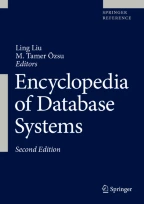Synonyms
Link analysis
Definition
The primary mission of web search engines is to obtain the best possible results for a given user query. To accomplish this effectively, they rely on two crucial pieces of information: the relevance of a web page to the query and some aspect of the quality of the web page that is independent of the query. Relevance, the extent to which the query matches the content of the web page, is formalized and extensively studied in the field of information retrieval. Quality, on the other hand, is more nebulous and less well-defined. Nevertheless, one can identify three concrete and somewhat complementary aspects to the quality of a web page. The first is based on the absolute goodness of the web page and its associated meta-data. This might depend on a variety of parameters, including the worth of content that exists on the web page, the reputation of the person who authored the web page, the importance of the web site that hosts the web page, and so on. The...
Access this chapter
Tax calculation will be finalised at checkout
Purchases are for personal use only
Recommended Reading
Bar-Yossef Z, Broder A, Kumar R, Tomkins A. Sic transit gloria telae: towards and understanding of the web’s decay. In: Proceedings of the 12th International World Wide Web Conference; 2004. p. 328–37.
Bharat K, Henzinger M. Improved algorithms for topic distillation in a hyperlinked environment. In: Proceedings of the 21st Annual International ACM SIGIR Conference on Research and Development in Information Retrieval; 1998. p. 104–11.
Borodin A, Roberts GO, Rosenthal JS, Tsaparas P. Link analysis ranking algorithms, theory, and experiments. ACM Trans Internet Tech. 2005;5(1):231–97.
Brin S, Page L. The anatomy of a large-scale hypertextual web search engine. Comput Netw. 1998;30(1–7):107–17.
Chakrabarti S, Dom B, Gibson D, Kleinberg J, Raghavan P, Rajagopalan S. Automatic resource compilation by analyzing hyperlink structure and associated text. Comput Netw. 1998;30(1–7):65–74.
Chakrabarti S, Dom B, Gibson D, Kumar R, Raghavan P, Rajagopalan S, Tomkins A. Spectral filtering for resource discovery. In: Proceedings of the ACM SIGIR Workshop on Hypertext Analysis; 1998, p. 13–21.
Garfield E. Citation analysis as a tool in journal evaluation. Science. 1972;178(4060):471–9.
Gibson D, Kleinberg J, Raghavan P. Inferring Web communities from link topology. In: Proceedings of the ACM Conference on Hypertext; 1998. p. 225–34.
Gyöngyi Z, Garcia-Molina H, Pedersen J. Combating web spam with TrustRank. In: Proceedings of the 30th International Conference on Very Large Data Bases; 2004. p. 576–87.
Haveliwala TH. Topic-sensitive PageRank: a context-sensitive ranking algorithm for web search. IEEE Trans Knowl Data Eng. 2003;15(4):784–96.
Kessler MM. Bibliographic coupling between scientific papers. Am Doc. 1963;14(1):10–25.
Kleinberg J. Authoritative sources in a hyperlinked environment. J ACM. 2000;46(5):604–32.
Lempel R, Moran S. SALSA: the stochastic approach for link-structure analysis. ACM Trans Inform Syst. 2001;19(2):131–60.
Rafiei D, Mendelzon AO. What is this page known for? Computing web page reputations. Comput Netw. 2000;33(1–6):823–35.
Small H. Co-citation in the scientific literature: a new measure of the relationship between two documents. J Am Soc Inform Sci. 1973;24(4):265–9.
Author information
Authors and Affiliations
Corresponding author
Editor information
Editors and Affiliations
Section Editor information
Rights and permissions
Copyright information
© 2018 Springer Science+Business Media, LLC, part of Springer Nature
About this entry
Cite this entry
Kumar, R. (2018). Web Page Quality Metrics. In: Liu, L., Özsu, M.T. (eds) Encyclopedia of Database Systems. Springer, New York, NY. https://doi.org/10.1007/978-1-4614-8265-9_460
Download citation
DOI: https://doi.org/10.1007/978-1-4614-8265-9_460
Published:
Publisher Name: Springer, New York, NY
Print ISBN: 978-1-4614-8266-6
Online ISBN: 978-1-4614-8265-9
eBook Packages: Computer ScienceReference Module Computer Science and Engineering
